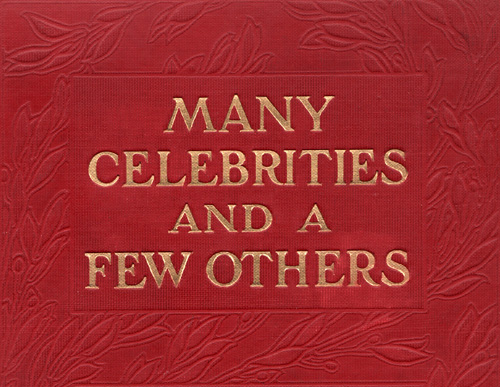1912
Many Celebrities and a Few Others
a Bundle of Reminiscences
|

|
|
William Henry Rideing (1853-1918) was born in Liverpool but made his
journalistic career in the USA in Chicago and later in Boston. He worked for
a time on The Youth's Companion. In June 1886 he was in London and
his editor Daniel S Ford asked if he could call on Wilkie who naturally
agreed. "It
is needless to add that I shall be delighted to make Mr Rideing’s
acquaintance on his arrival in London" (To
Ford 1 June 1886). This reminiscence - published more than a quarter of a century
later - is based on that meeting and describes Wilkie at the age of 62.
There is also an earlier reference to Wilkie in the chapter on James Payn.
Wilkie later wrote to Rideing saying he could not write again for the
publisher Messrs Perry Mason & Co. due to their unwillingness to allow him
the time to register his copyright in the UK (To Rideing, 22 December 1886
The Public Face of Wilkie Collins 2005, IV pp217-218). |
It established [James] Payn commercially in the trade as a
money-maker, the only kind of author publishers welcome: it charmed the young
Duke of Albany, and frequently thereafter Payn became a guest at Claremont. But
he was more than a knitter of plots. He had a fluid and limpid style, akin to
that of Mr. Howells, as airily natural, if less subtle, and, instead of the
gravity of Wilkie Collins, who was as ponderous as a judge on the bench, he had
an abounding and permeating humour which was always peeping out and slyly
laughing round the corner. Perhaps he laughed in his sleeve at his own
melodrama, though he resented all criticism that imputed a lack of painstaking
in his work.
(p237)
XVI
WILKIE COLLINS, SIR WALTER BESANT, AND IAN MCLAREN
AGAIN in memory I call at Gloucester Place
to see Wilkie Collins in his little house, a cheerful, rotund, business-like man
of a height disproportionate to his ample girth. Already advanced in years, he
had the briskness of middle age, and the freshness of youth in his complexion.
His luxuriant beard was like spun silver, and had he worn a long mediaeval cloak
and peered out of it below its cowl, he would have made the traditional Faust as
that character appears before Mephistopheles transforms him. Notwithstanding his
matter-of-fact speech with its occasional cockneyisms of phrase and
pronunciation; notwithstanding his well-tailored and modern apparel, as modish
as that of any city man; there was a suggestion of the pictorial necromancer
about him, which grew as one listened to him, and instead of the prints, of
which he was a connoisseur, against the walls, one almost expected to find the
apparatus of an alchemist.
He spoke of having visions and extraordinary dreams, not with
any apprehension of mental disorder, nor as revealing anything abnormal, but
without visible consciousness of the bewilderment he was producing in the
listener. I suppose that as he proceeded he must have seen the question in my
face, for as he turned to show me a valuable print he had picked up at half a
crown in the neighbourhood of Leicester Square, and described with excellent
mimicry the transaction between himself and the old woman who sold it, he
offered me a brief explanation, "Coffee. I drink too much of it."
He was writing for us a few stories based on circumstantial
evidence, and he frankly exhibited to me the books of remarkable trials which he
was using as material. Let not any literary aspirant in the imitative age think
from this that he can do the same thing; that old trials in sheepskin volumes
will relieve him of the labour of invention and imagination; that ready-made
plots are to be bought in Chancery Lane or the Strand at a few shillings apiece.
Stevenson's "sedulous ape" is a part often played in the vanity of youth, but it
leads to sad eye-openings. Unskilled and inexperienced hands may boil all the
ingredients of an epicurean broth without being able to extract from them the
savour of the cook's secret, incommunicable by formula. The trials are
accessible to all, but all attempts to transmute them, as Wilkie Collins did,
into little dramas enacted by human beings in natural surroundings, are sure to
be futile, and the discouraged novice will learn that what seems so easy depends
after all on the possession and exercise of that creative imagination which the
books do not supply.
(pp 246-247)
From Many Celebrities and a Few Others, New York, 1912
go back to biographies list
go back to Wilkie Collins front page
visit the Paul Lewis front page
All material on these pages is © Paul Lewis 1997-2008
